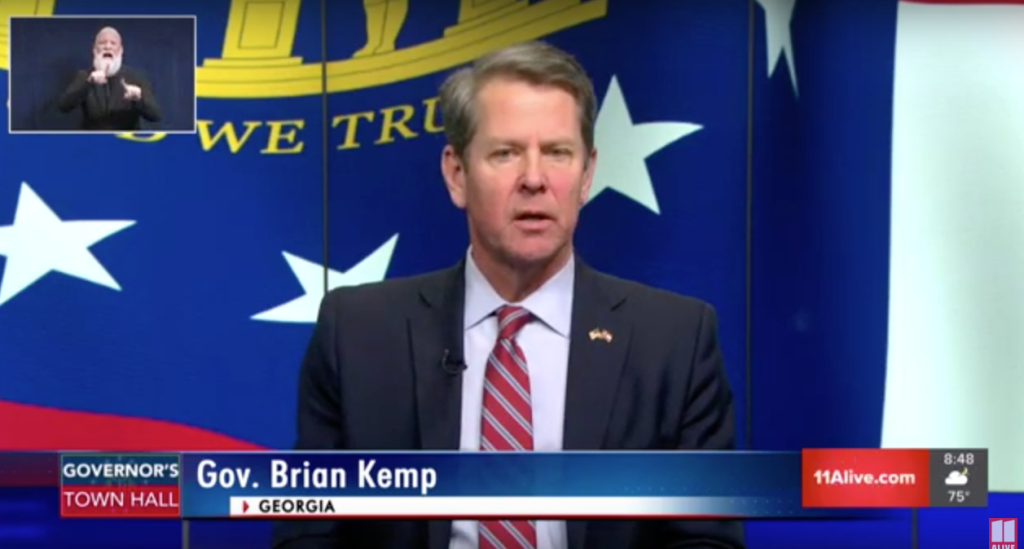Kemp defends lack of statewide shelter in place
Published 1:00 pm Friday, March 27, 2020

- Gov. Brian Kemp and health officials answer questions about coronavirus Thursday during an hourlong televised event.
ATLANTA — Gov. Brian Kemp defended Thursday the lack of a statewide shutdown, citing the impact it would have on counties which are reporting no cases of COVID-19.
During a televised town hall, Kemp said local elected officials can make the best decisions for their areas but the governor must take into consideration the economic impact a shutdown would have on the entire state.
“I’m having to govern the whole state. It’s much different from certainly what Mayor Bottoms and certain local elected officials have done,” he said. “… I’m supportive of the actions they’re taking.”
Kemp said his March 23 executive order reflected things he knew “we needed to do from a statewide perspective,” such as banning large gatherings and mandating a shelter in place for “medically fragile” populations.
“I think we’ve targeted the areas that we need to target,” he said. “If we need to do more in the future I still certainly have tools still in the toolbox.”
Kemp deferred to local elected officials, who can make decisions, he said, based on their own communities’ needs.
“There’s a lot of great things going on at the local level, if we can get our citizens to follow these directions,” Kemp said. “It will absolutely turn this curve. We can get to the other side of this virus and it’s critical that we do that for our health care system.”
Atlanta Mayor Keisha Lance Bottoms made the decision to institute a stay at home order for Atlanta residents March 23.
“If it were my call, I would have a stay at home order for the entire country, but obviously that is not my call,” she said during the town hall. “I certainly understand and respect the governor’s position that he is balancing diverse constituencies across the state and their needs may be a bit different than ours.”
Dr. Carlos del Rio, the executive associate dean for Emory at Grady Health System, in an online presentation for local elected officials this week, said if no further action is taken, a team of medical experts estimate that at most, Georgia will see nearly 1.4 million coronavirus cases, 276,0000 hospitalizations and more than 27,000 deaths.
“If we do the right things, we can bring the number of deaths down to about 1,000 in the state of Georgia,” he said. “Doing the right things is not going to stop this virus, but it is going to dramatically decrease the impact on the health care system.”
The leading expert in infectious diseases outlined steps local officials can take to support their health care systems by preventing mass gatherings, limiting public transit and isolating infected individuals.
“Things are going to get worse before they get better. We really need to prepare for the worst,” he said. “This is going to be long, this is going to take three or four months before things start turning around.”
The following day, the Georgia Municipal Association called on local leaders in all 538 cities in the state to declare public health emergencies and shut down non-essential businesses.
Georgia Department of Public Health Commissioner Dr. Kathleen Toomey said there is evidence social distancing orders have caused cases to level off in areas with initially high numbers, such as Rome.
“I’m less focused on the exact number (of cases),” she said, “and more focused on how we can get individuals to think about prevention.”
When asked if she would recommend a statewide shelter in place, Toomey said all areas are different — communities hit harder by the outbreak require “aggressive mitigation” where other areas of the state may not.
“What’s good for Atlanta — which I believe is the correct thing Mayor Bottoms did — may not be the correct thing for these other areas right now that have limited spread,” Toomey said.
Toomey said the state is working with the Georgia Emergency Management Agency and the federal government to garner enough protective equipment for health care workers on the front lines of the outbreak.
“We are assessing the needs of the hospitals constantly,” she said. “We have our first of shipment of ventilators coming in to help some of the harder hit areas like Rome and Albany. And we’re still keeping track of that.”
This week, state health districts cited continued shortage of personal protective equipment and backlog of test results from private labs as their main obstacles.
When asked about possible Medicaid expansion after so many Georgians have lost their jobs and subsequently health insurance, Kemp said Medicaid expansion would fall on state lawmakers.
“The whole Medicaid argument would be a legislative question,” he said. “Obviously with the legislature suspended, that is not an issue I’ve been focused on.”
For a number of different questions, officials deferred to local control, including Georgians who asked for protection against eviction after losing jobs.
“Clearly there’s a role when the state government takes the lead, but in many of these situations, the state government has to defer to local control,” Insurance Commissioner John King said.
Throughout the hourlong televised event, health officials and members of Kemp’s Coronavirus Task Force emphasized the public’s role in curbing the outbreak.
Homer Bryson, director of the Georgia Emergency Management and Homeland Security Agency, said unlike a natural disaster, Georgians can prevent coronavirus spread through their own actions.
“The uniqueness of this, is the ability for the citizens of our state to control how big of an issue this truly is and how quickly we can recover and get back to normal.”





